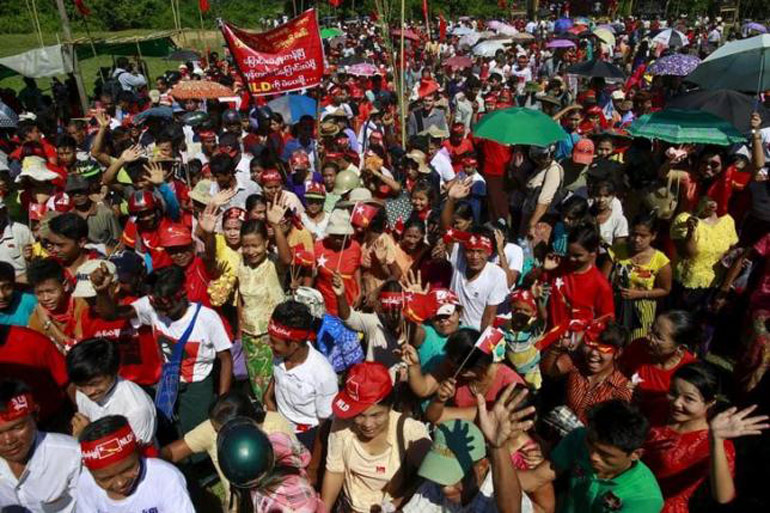Monday Feb 23, 2026
Monday Feb 23, 2026
Monday, 19 October 2015 00:00 - - {{hitsCtrl.values.hits}}
 Supporters wave as they head back following Myanmar pro-democracy leader Aung San Suu Kyi’s speech during her campaign rally for the upcoming general elections in Thandaw, Rahine state, 17 October
Supporters wave as they head back following Myanmar pro-democracy leader Aung San Suu Kyi’s speech during her campaign rally for the upcoming general elections in Thandaw, Rahine state, 17 October
Reuters: Muslim supporters of Myanmar opposition leader Aung San Suu Kyi said on Saturday they hoped a government lead by her National League for Democracy (NLD) would improve their lives in Rakhine State, where many still face discrimination after violence in 2012 and 2013.
The Muslims have put their hopes in the NLD even though the party did not field a Muslim candidate on its lists of over 1,100 hopefuls standing in the Nov. 8 election and has been criticized for not speaking out against their marginalisation.
The campaign ahead of what is billed as Myanmar’s first free and fair election in 25 years, which started a month ago, has seen a spike in tensions stoked by anti-Muslim hardline Buddhist group Ma Ba Tha, which has sharply criticized the NLD. On Saturday, Suu Kyi spoke in Thandwe, where in October 2013 five Kaman Muslims were murdered during a flare-up in religious violence.
Many Muslim residents of Thandwe and surrounding villages who came to see Suu Kyi said they still supported her and hoped the NLD would help to end their discrimination and foster reconciliation between Buddhists and Muslims.
“We have a little hope,” said Win Naing, 41. “We don’t have equal rights. I hope that if Mother Suu wins the election, we will get equal rights,” Win Naing said. Another supporter, Tun Win, 48, from a village outside Thandwe, said Muslims faced bullying from Buddhists and that many Muslims had been denied national identity cards by the government, curbing their freedom of movement. He hoped the NLD would make obtaining them easier.
“They say, ‘go to Yangon,’ but we can’t because we don’t have any identity cards,” he said. “We come and go around here and it is like a prison.” Suu Kyi made no mention of the violence in Thandwe during her speech on Saturday. During a speech in the nearby town of Tongup on Friday she also did not mention the 2012 killing of 10 Muslims, who were pulled from a bus by a mob in the town.
While avoiding references to specific incidents, Suu Kyi made broader points about religious tensions and violence.
“It is very important that all people regardless of race and religion living in our country must be safe,” she said. “We can have peace in our country only if the people feel safe both mentally and physically,” she said.
Unlike the marginalized Rohingya Muslims, who also live in Rakhine, the Kaman from Tandwe are one of Myanmar’s 135 recognised ethnic groups. The Rohingya live predominantly in Sittwe and northern Rakhine, where 140,000 were displaced by violence in 2012.uu Kyi will not visit Sittwe or northern parts of Rakhine during her three-day trip through the western state. The Nobel peace laureate has been criticized for saying little about the Rohingya’s plight.